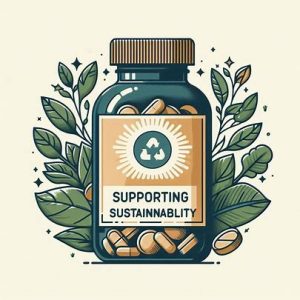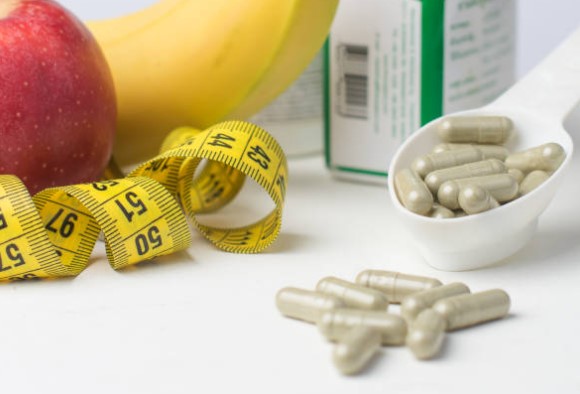Environmental Impact of NMN Supplement Production and Packaging
 NMN supplements, celebrated for their potential anti-aging effects, have grown increasingly popular. However, their rising demand raises an important question: how sustainable are these products? From raw material sourcing to final packaging, NMN supplement production impacts the environment in numerous ways. Some companies are now adopting eco-friendly practices, which sets them apart in an industry that can heavily rely on resource-intensive methods.
NMN supplements, celebrated for their potential anti-aging effects, have grown increasingly popular. However, their rising demand raises an important question: how sustainable are these products? From raw material sourcing to final packaging, NMN supplement production impacts the environment in numerous ways. Some companies are now adopting eco-friendly practices, which sets them apart in an industry that can heavily rely on resource-intensive methods.
For a deeper dive into the best eco-conscious NMN brands, read more from this article source: bestnmnsupplementsantiagingresveratrol.omeka.net. Below, we explore the environmental impacts of NMN supplement production, identify sustainable practices, and highlight brands making a positive difference.
The Environmental Toll of NMN Supplement Production
NMN, or nicotinamide mononucleotide, is a compound derived from vitamin B3, primarily used to support cellular energy production and slow the aging process. However, its production can strain natural resources, as it often involves:
- High-energy manufacturing processes: Creating NMN requires substantial energy, as it goes through multiple complex synthesis stages.
- Use of raw materials: Sourcing large quantities of raw materials can lead to environmental degradation if not managed sustainably.
- Chemical waste: The synthesis of NMN often results in chemical by-products, which, if improperly handled, can harm ecosystems and water supplies.
Sustainable Production Practices
To reduce their ecological footprint, some brands are embracing sustainable manufacturing techniques. These include:
- Eco-friendly sourcing: Selecting sustainably harvested raw materials that don’t harm biodiversity or ecosystems.
- Green chemistry: Employing chemical processes that minimize waste and reduce energy consumption.
- Energy-efficient factories: Utilizing renewable energy sources, like solar or wind power, to minimize carbon emissions during production.
Brands that integrate these practices set a new standard in supplement manufacturing, emphasizing environmental responsibility and product efficacy.
Packaging: An Overlooked Environmental Concern
Packaging is an often overlooked aspect of NMN supplements, yet it significantly impacts the environment. Traditional packaging materials, such as plastic bottles and single-use seals, contribute to plastic pollution and increase landfill waste. Additionally, many NMN supplements are individually packaged in plastic capsules, adding even more waste.
Sustainable Packaging Solutions
To address this, some eco-conscious brands are turning to sustainable packaging solutions, such as:
- Biodegradable materials: Using packaging made from plant-based or compostable materials that break down naturally over time.
- Recyclable containers: Choosing containers that can be recycled, like glass or certain eco-friendly plastics.
- Minimalist packaging: Reducing excess packaging layers to reduce waste and resource use.
By adopting sustainable packaging, these brands help reduce the environmental impact of NMN supplements, promoting a more circular economy.
Brands Leading the Way in Eco-Friendly NMN Production
A few forward-thinking NMN brands are standing out by committing to greener practices. Here are some examples:
- TruNiagen: Known for its stringent quality standards, TruNiagen emphasizes eco-friendly production by prioritizing green chemistry methods and renewable energy.
- Elysium Health: This brand focuses on high-quality ingredients and uses recyclable packaging to minimize waste.
- ProHealth Longevity: ProHealth integrates sustainable sourcing and biodegradable packaging materials, making it one of the more environmentally conscious options.
These brands demonstrate that environmental responsibility is achievable within the NMN industry, proving that high-quality supplements can be effective and eco-friendly.
Why Eco-Friendly NMN Supplements Matter
Choosing eco-friendly NMN supplements supports environmental sustainability, which benefits both people and the planet. Here’s why making the switch to greener brands is important:
- Reduces pollution: Sustainable practices lower chemical waste and greenhouse gas emissions, helping combat climate change.
- Supports biodiversity: Eco-friendly sourcing prevents the over-extraction of raw materials, protecting ecosystems and species.
- Encourages industry change: Supporting brands prioritizing sustainability encourages others in the supplement industry to adopt similar practices.
Tips for Choosing Sustainable NMN Supplements
As a consumer, you can make informed choices by looking out for a few key factors:
- Check for certifications: Look for labels like USDA Organic or non-GMO, which indicate adherence to eco-friendly standards.
- Research the brand’s practices: A quick look at a brand’s website or product page often reveals their approach to sustainability.
- Look for minimal packaging: Choose products that use biodegradable or recyclable materials and avoid excessive packaging.
These steps can help you make more environmentally conscious decisions when purchasing NMN supplements, supporting brands prioritizing the planet.
READ ALSO: The Green Revolution: Transforming Weight Loss with Eco-Friendly Supplements
Conclusion
While NMN supplements offer promising health benefits, their production and packaging carry environmental costs. However, some brands are adopting more sustainable practices, from green manufacturing to eco-friendly packaging solutions. Consumers can reduce their environmental impact by choosing these eco-conscious brands and contribute to a more sustainable future. The power to drive change lies with consumers, who can make a difference by supporting companies committed to sustainability.
 A recent study revealed that climate change is potentially threatening food production as a result of reduced production of pollen in plants and fewer pollen diversity. The research underscored the critical importance of developing conservation policies aimed at protecting pollinators in order to maintain fundamental pollination services during this period of global warming.
A recent study revealed that climate change is potentially threatening food production as a result of reduced production of pollen in plants and fewer pollen diversity. The research underscored the critical importance of developing conservation policies aimed at protecting pollinators in order to maintain fundamental pollination services during this period of global warming. The team of researchers conducted their exploration in the Great Basin and Sierra Nevada mountains, which are homes to more than 200 butterfly species,many of which are pollinators. The latter refers to carriers of pollen from male to female plant parts as a means of promoting fertilisation that leads to fruit production.
The team of researchers conducted their exploration in the Great Basin and Sierra Nevada mountains, which are homes to more than 200 butterfly species,many of which are pollinators. The latter refers to carriers of pollen from male to female plant parts as a means of promoting fertilisation that leads to fruit production. Marine biologist Dr. Elizabeta Briski, an expert in invasion ecology at the GEOMAR Centre for Ocean Research in Kiel, Germany, says, “biological invasion is widely believed to have caused the spread of diseases and extinctions that resulted in trillions of dollars in costs of damage and control.” As the related numbers continue to increase, conducting large-scale studies to understand and predict invasion patterns is crucial to protect economies, societies and environments.
Marine biologist Dr. Elizabeta Briski, an expert in invasion ecology at the GEOMAR Centre for Ocean Research in Kiel, Germany, says, “biological invasion is widely believed to have caused the spread of diseases and extinctions that resulted in trillions of dollars in costs of damage and control.” As the related numbers continue to increase, conducting large-scale studies to understand and predict invasion patterns is crucial to protect economies, societies and environments. Such circumstances therefore can bring about a greater magnitude of socio-economic,
Such circumstances therefore can bring about a greater magnitude of socio-economic,  Researchers at Georgia Institute of Technology have been suggesting the restoration of coastal
Researchers at Georgia Institute of Technology have been suggesting the restoration of coastal  The
The  Here’s what happens: part of the biomass produced by mangroves and seagrasses during the photosynthesis process gets buried in sea sediments. This denotes that if the wetland’s ecosystem continue to permanently bury the biomass, then atmospheric carbon dioxide can be permanently and regularly kept buried in the wetlands.
Here’s what happens: part of the biomass produced by mangroves and seagrasses during the photosynthesis process gets buried in sea sediments. This denotes that if the wetland’s ecosystem continue to permanently bury the biomass, then atmospheric carbon dioxide can be permanently and regularly kept buried in the wetlands.


 Male conduct including environmental attitudes and actions is greatly shaped by social conventions and peer pressure. Men could feel under pressure to fit conventional macho stereotypes, which usually give individual success and competitiveness first priority over environmental issues. This might result in actions detrimental to the surroundings including waste, pollution, and too high consumption.
Male conduct including environmental attitudes and actions is greatly shaped by social conventions and peer pressure. Men could feel under pressure to fit conventional macho stereotypes, which usually give individual success and competitiveness first priority over environmental issues. This might result in actions detrimental to the surroundings including waste, pollution, and too high consumption.

 Excessive NO in aquatic environments can induce eutrophication, a process whereby too abundant nutrients produce algal blooms, depleting oxygen levels and damaging aquatic life. If incorrectly disposed of or absorbed into the environment, nitric boost pills could exacerbate this issue.
Excessive NO in aquatic environments can induce eutrophication, a process whereby too abundant nutrients produce algal blooms, depleting oxygen levels and damaging aquatic life. If incorrectly disposed of or absorbed into the environment, nitric boost pills could exacerbate this issue.
 In recent years, the field of mental health has witnessed a growing interest in an unconventional treatment for depression: psilocybin, the active compound found in magic mushrooms. This psychedelic substance, long associated with spiritual and recreational use, is now at the forefront of clinical research for its potential in treating various forms of depression, including cases resistant to traditional therapies.
In recent years, the field of mental health has witnessed a growing interest in an unconventional treatment for depression: psilocybin, the active compound found in magic mushrooms. This psychedelic substance, long associated with spiritual and recreational use, is now at the forefront of clinical research for its potential in treating various forms of depression, including cases resistant to traditional therapies.



 Taking care of our liver is essential for maintaining good overall health. Our liver is responsible for important functions in our body, so it’s crucial to prioritize its well-being. Adopting a nutritious diet is one effective way to support a healthy liver. Let’s talk about the importance of choosing the right foods to support your liver function and provide you with practical, easy-to-follow tips on incorporating liver-friendly meals into your daily routine.
Taking care of our liver is essential for maintaining good overall health. Our liver is responsible for important functions in our body, so it’s crucial to prioritize its well-being. Adopting a nutritious diet is one effective way to support a healthy liver. Let’s talk about the importance of choosing the right foods to support your liver function and provide you with practical, easy-to-follow tips on incorporating liver-friendly meals into your daily routine. Moreover, consumers are constantly advised not to take medicines or supplements without first consulting their primary care doctor. The long and short of it is that those who buy Cortexi to improve their cochlear health have little reason to complain that the supplement is not effective as a medical solution for their hearing impairment problem. In which case, dissatisfied users can simply claim the money-back guarantee after 60 days.
Moreover, consumers are constantly advised not to take medicines or supplements without first consulting their primary care doctor. The long and short of it is that those who buy Cortexi to improve their cochlear health have little reason to complain that the supplement is not effective as a medical solution for their hearing impairment problem. In which case, dissatisfied users can simply claim the money-back guarantee after 60 days. According to the Cortexi product information, the proprietary blend consists mostly of herbals, antioxidants, vitamins and minerals. They work together synergistically in providing cochlear nourishment that can strengthen an aging person’s hearing ability.
According to the Cortexi product information, the proprietary blend consists mostly of herbals, antioxidants, vitamins and minerals. They work together synergistically in providing cochlear nourishment that can strengthen an aging person’s hearing ability.






 The highly-resistant features of spores have made it difficult for chemical manufacturers to come up with new disinfectants that can destroy not only the microorganisms but the spore-forming bacteria that build their ecology.
The highly-resistant features of spores have made it difficult for chemical manufacturers to come up with new disinfectants that can destroy not only the microorganisms but the spore-forming bacteria that build their ecology. Although some bacillus species have harmful effects, those approved for probiotic purposes are the benign organisms proven as having low risks in producing pathorgenic and toxigenic substances harmful to humans, animals and plants. In fact, in the US, the use of spores in probiotic biotechnology is governed by the Toxic Substances Control Act and enforced by the Environmental Protection Agency (EPA),3
Although some bacillus species have harmful effects, those approved for probiotic purposes are the benign organisms proven as having low risks in producing pathorgenic and toxigenic substances harmful to humans, animals and plants. In fact, in the US, the use of spores in probiotic biotechnology is governed by the Toxic Substances Control Act and enforced by the Environmental Protection Agency (EPA),3

